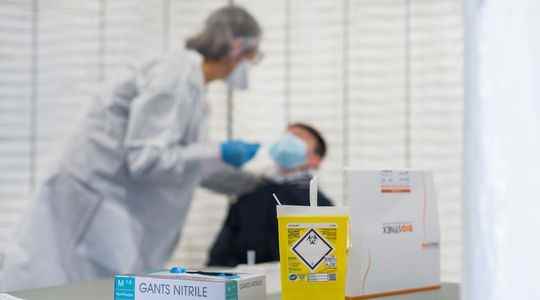For the past few months, the question has been running through the minds of the last people who have never tested positive. Until when will they be able to pass between the drops? And above all, is there a chance that they are less likely to be infected with this new coronavirus? With more than 400,000 cases per day, and an incidence rate that exceeds 3,700 cases per 100,000 inhabitants in France, the threat seems to be everywhere.
Worse, in the youngest categories and in regions where the incidence rate is highest, the risk is even greater. For example, an event taking place in the Bouches-du-Rhône department and bringing together 25 people (while the incidence rate exceeds 4000), thus includes an 88% risk that a person positive for Covid-19 will attend. find. After two years of epidemic and conditions that seem to bring us ever closer to the virus, some have yet never been infected.
Beyond the first explanations, such as respect for barrier gestures, caution in the face of risky situations or the signals of a previous infection which would not have been officially detected by a test, the possibility of having dodged the virus does exist. “The transmission potential of this virus is very high but it does not reach 100%, therefore it is logical that some escape the virus”, answers Jean-Daniel Lelièvre, head of the clinical immunology department of the CHU Henri- Mondor in Créteil, and member of the High Authority for Health (HAS). With a rate of reproduction of the virus which slightly exceeds the threshold of 1, there would be, according to him, no reason to think that the entire population will be infected with the virus. “We can imagine that this will be the case over a very long period, but not in the current temporalities”, underlines Jean-Daniel Lelièvre. “And fortunately otherwise everything that we have done so far to avoid contamination would have been useless,” he adds.
Multifactorial causes
But that’s not all, certain factors could explain why part of the population is less susceptible to infection. On the one hand, vaccination, even if it does not prevent transmission, has played an important role in reducing new cases. And then there are added, in a multifactorial way, different criteria that can make a person more able to resist infection. “There are reasons related to lifestyle, but also immunological or genetic reasons… It is all of these factors that determine whether or not you catch the virus”, explains Olivier Schwartz, head of the Virus and Immunity Unit at the Institut Pasteur.
Thus, several studies have recently shown that people belonging to type O blood group have a slightly less chance of being infected with SARS-CoV-2. The diversity of the human genome also makes us more or less exposed to certain diseases. “For example, for HIV, we know that some people have mutations in a receptor for this virus that protects them from infection,” he explains. According to this researcher, a similar phenomenon could occur for some with Covid-19. In some people the ACE2 cell receptor (a small part of the cell surface on which SARS-CoV-2 docks), is more or less present. “We know the genetic diversity which means that we can have lower levels of ACE2 from one individual to another and therefore we can be more resistant to the virus”, adds Olivier Schwartz.
Genetic diversities
The complexity of our organism, and the pressures it undergoes also modify our chances of being infected. “The factors are multiple, the environment or whether or not you have previous immune responses, for example. All of this can modify your receptivity to the virus”, underlines Jean-Daniel Lelièvre. An infectious disease can thus generate high levels of interferons, a protein produced quickly by the immune system when faced with a virus and which aims to prevent its replication. A very useful form of protection against SARS-CoV 2. “All this genetic diversity means that we respond differently from each other, but it’s not white or black and there is no specific gene that would prevent infection with Covid-19”, warns the immunologist.
The recurrence of risky situations, and the significant contagiousness of the Omicron variant, leaves some doubt in the brains of individuals in whom tests, at regular intervals, have been negative. So how do you know if you have crossed paths with the virus? Some laboratories offer serological tests, an analysis that allows after a blood test to detect or not the presence of antibodies produced by an infection, but they have several pitfalls.
Serology falls apart
For several months, these tests have targeted antibodies called anti-S, which are produced by the body after infection with covid, but also after vaccination. “Current serology, targeting anti-S antibodies, is therefore no longer capable of determining whether these antibodies are the result of a vaccination, or of an infection”, underlines Michel Sala, the medical director of the Cerballiance laboratory network.
With nearly 80% of French people having received at least one dose of vaccine, “the medical interest of a serological test is low”, recognizes Michel Sala. Especially since these tests can present false negatives, in particular because of the erosion over time of the level of antibodies. “Today these tests are mainly used to monitor the response to vaccination in immunocompromised people, and even when the results are positive we cannot be sure that the person is immune to the virus, because we do not know the levels. of antibodies necessary to be protected”, deciphers the medical director of Cerballiance. If the chances of avoiding the Covid are dwindling, the uncertainty remains.
